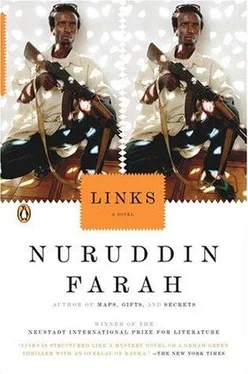Jeebleh spoke in a whisper and with the caution of someone avoiding a mine. “You were never in support of StrongmanSouth yourself?”
“Hell no, I wasn’t.”
Again Jeebleh spoke tentatively: “Someone must have been, for there were always crowds everywhere he went, women screaming supportively, and used as shields?”
“I can name a large number of my clansmen who wanted peace,” Dajaal said, “which, in fact, was why we were holding the meeting. We didn’t like where the American-in-Charge and StrongmanSouth were taking us, and we didn’t approve of their confrontational styles. We thought they were so alike, the two of them, and wished they’d fight their own fight, in a duel — bang, bang, one of them dead!”
“How’s your granddaughter doing, the one who was caught up in the helicopter’s wake?” Jeebleh asked.
“She hasn’t spoken since that day.”
“How old is she?”
“She started to vegetate so early in her infancy,” Dajaal said, “that we don’t think about her age anymore. She startles easily, and the slightest noise causes her to burst into tears, and nothing will calm her. There’s nothing wrong with her motor mechanism. Dr. Bile has been of tremendous help, thank God, but I doubt if she’ll ever grow to be normal.”
“What about the mother?”
“What harm did the mother do to them ?” Dajaal raged.
In his mind, Jeebleh saw a knight on horseback, sword in hand, ready to take vengeance and die in the service of justice. “What about the mother?” he repeated.
“To calm her down, they handcuffed her. Why?”
Bile was very lucky to have Dajaal as his man Friday, Jeebleh thought. The man struck him as upright, straightforward, and honorably courageous. Yet he couldn’t decide how far Dajaal’s loyalty would extend to him. He watched the road ahead in silent intensity, worried, like an insect focusing all it had in the way of wiliness to avoid being hurt.
The car suddenly stopped, and the driver and Dajaal exchanged a nod. Fear can make a man sit slightly off balance, as though he were hard of hearing, listening for an ominous sound, shoulders hunched, ears pricked. Jeebleh’s whole body went stiff, as he stared at the solitary Coke bottle that stood majestically in the center of the road. He didn’t know what to make of it. In a coordinated manner, the driver moved in the direction of the glove compartment at the same time that Dajaal lifted the machine gun off the floor with his feet, flinging it up and catching it just as Jeebleh had imagined earlier. He had agile feet, Dajaal did, and he deployed them more adeptly than some use their hands. A minute passed. Nothing happened. Then Dajaal and the driver spoke in low whispers. Jeebleh broke the grief: “Are we at the green line?”
Both Dajaal and the driver shook their heads and then, still not speaking, allowed themselves the rare luxury of smiling, in the loaded way two adults might exchange a smile when a child asks an inappropriate question. Their watchful eyes no longer on the Coke bottle, the driver and Dajaal communicated in gestures, after which the driver pressed the horn three times, once gently, twice decisively, then paused and waited.
An old man and two boys, all with guns, emerged from behind an abandoned building, the man leprous, one boy with his right foot clumsy with elephantiasis, the other boy afflicted with wrist-drop agony. The boys lowered their weapons, their lips traced with smiles of relief. The old man, whom Jeebleh presumed to be the father and the leader of the band, aimed his gun at the vehicle. As though on a dare, the car crept up to the Coke bottle, which fell on its side. Jeebleh watched this with mixed pity and amusement. Dajaal wound down his window and threw a wad of money tied with a rubber band at the feet of the old man.
The smaller of the boys bent down and retrieved the wad. It was only when the vehicle came level with them — near enough to smell their unwashed bodies — that Jeebleh realized that all three had imitation guns, poor-quality mahogany painted black.
“What are they?” he asked.
Maybe Dajaal picked up on his unease or maybe he didn’t, but Jeebleh was instantly regretful, wishing he had said “who” instead of “what.”
The driver spoke for the first time, his accent clearly from Mudugh. “Down in the south,” he said, “we call them ‘idiots of the north.’”
“Because they are a harmless lot?”
Dajaal had had enough. “Let’s get going!”
And as the vehicle moved, Dajaal explained that the “three-man militia” had their checkpoint in a no-man’s-territory, in the belief that they could continue profiting from their stickups. “Myself, I’m impressed with their cunning, because they expose a major weakness in the idea of the clan. After all, they too claim to represent the interests of a clan family — even if it’s the smallest unit within the larger clan to which the two principal contestants, StrongmanSouth and StrongmanNorth, also belong. It’s clever of them to poach in the no-man’s-territory, claiming their share in what is to be got.”
The car slowed, the driver changing gears, looking this way and that. He signaled left but took a right and then — how very odd — reversed, managing to avoid a mound of dirt. They were at a crossroads. A cluster of children appeared. They stood by, watching.
“We’re now entering the no-man’s-territory, where the so-called green line is,” the driver said, pointing at a spot in the road to his right.
This was comparable to pointing at a spot in a river and saying that one’s parents had drowned there several years before. To Jeebleh, Mogadiscio’s green line and the no-man’s-land both expressed not so much inadequate demarcations of territories, but rather the absence of compromise between the realities and the political zeal of the warlords. Such a line, and that no-man’s-land, would continue to exist as long as these incompetent men refused to reach a compromise.
The roads had no names. No flags flew anywhere near where the car was now parked, and there were no sheds, however ramshackle, to mark the spot. For the first time on this drive, there were a lot of people, busy as shoppers; buses disgorging more people; lean-to shacks, where you could have tea; stalls where women ran their haberdasheries.
“Can I step out?” Jeebleh asked.
“And do what?” said the driver.
“I’d like to have a feel of the place, if I may.”
“We would advise you not to,” the driver told him.
Jeebleh nonetheless got out of the vehicle, leaving the door ajar, and crouched in the bent-knee posture of a supplicant before a deity. Passersby, men and women hurrying to catch the bus that would take them somewhere, gawked at him, some looking amused, others uncomprehending. What was he doing? Humbling himself before the god of peace, or Mother Earth herself? The driver shouted to him to get back in the car.
A quarter of a kilometer later, they stopped so unexpectedly that the car slid forward when the driver braked. Several armed youths in military fatigues, who had materialized out of nowhere as far as Jeebleh could tell, flagged them down. The oldest would have been in his twenties, and none of them had proper shoes to give their uniforms respectability. They seemed thuggish to Jeebleh, all boasting the armed youth’s standard chipmunk cheeks, their jaws busy chewing qaat . Their eyes were bloodshot and sore with exhaustion.
One of the youths recognized Dajaal, and said, “What if I hadn’t recognized you? We could’ve shot you. Be careful next time. Now get going, and fast!”
Once the car had driven off, Jeebleh asked, “What do they do to people they don’t know?”
“They make a nuisance of themselves,” Dajaal said, “they open the trunk of your car, pretending to check for weapons to confiscate, or for contraband goods on which StrongmanSouth’s income revenue police levy a hefty duty. Often, they take the goods themselves as their share, since they are members of StrongmanSouth’s militia. I would say every major and minor warlord runs the territory under his nominal control profitably.”
Читать дальше












